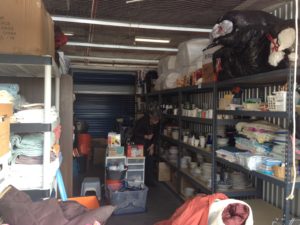
Since the fall of Kabul, Afghanistan, to Taliban forces on Aug. 15, almost 12,000 Afghan evacuees have arrived in the Greater Philadelphia area, according to city officials, and the Hebrew Immigrant Aid Society Pennsylvania is tasked with resettling 100 of them.
Of the 12,000 evacuees, 300 will need to be resettled in Philadelphia, 100 in Erie and 75 in Upper Darby. Nine of the HIAS PA evacuees have already arrived.
In addition, HIAS PA and area synagogues have played a key role in collecting donations.
HIAS PA received an overwhelming wave of community support, receiving $725,000 in donations between Aug. 14 and Sept. 21, Executive Director Cathryn Miller-Wilson said.
The monetary donations to HIAS PA are the tip of the iceberg. HIAS PA has long partnered with area synagogues to organize supply drives for refugees and newcomers, and the Jewish community’s response to the arrival of the Afghan evacuees was no exception.
“There’s a role the community — the Jewish community — can play,” said Judi Bernstein-Baker, former executive director of HIAS PA and a member of Mishkan Shalom, one of the synagogues with which HIAS PA has worked. “We have a sensibility for this. Didn’t we go through this? It’s almost in our DNA.”
“The amount of stuff that is in our building is both heartwarming and overwhelming at the same time,” said Amy Krulik, executive director of Main Line Reform Temple in Wynnewood.
MLRT has partnered with HIAS PA for almost 13 years, accepting donations of blankets, kitchen appliances, dishes and gift cards.
Since mid-August, MLRT volunteers have been overwhelmed with donations; they rented an off-site storage facility to accommodate the supplies received.
Previously, MLRT mostly relied on donations from the community. After the fall of Kabul, Krulik said that a “caravan of cars” from people across the area lined up at the synagogue with donations. She received hundreds of calls asking if people can donate to HIAS PA through MLRT.
More donations meant more help was needed to sort through the supplies, ensuring that they were of appropriate quality to give to evacuees.
Linda Brock, an MLRT congregant who has volunteered to help HIAS PA through the synagogue for 11 years, said volunteer numbers have doubled since August, from five to 10 or sometimes 12. Along with congregant Adele Margulies, Brock has delegated tasks and trained the newcomers.
Brock and Margulies usually work alongside volunteers from the synagogue, but now volunteers are “people from churches, people who have worked in other organizations, people who read about us and call and offer [to help].”
For Brock, it’s crucial that the quality of the items sorted for donation to HIAS PA doesn’t falter due to the overwhelming amount.

| Courtesy of Wikimedia Commons
Blankets and sheets cannot be frayed or stained. If they are, they are donated to local animal shelters rather than to evacuees.
HIAS PA also wanted to ensure that the items given to evacuees are culturally appropriate and useful. Single-use kitchen appliances like waffle irons are a no-go, as are wine glasses and bottle openers, as many of the donation recipients are Muslims who do not drink alcohol.
“Everything needs to be really in pristine condition because it’s the way you would treat a guest,” Krulik said. “It’s the way … to make sure that the families are being welcomed into the Philadelphia community.”
Mishkan Shalom also has gathered donations to HIAS PA, but after the fall of Kabul, the synagogue is taking a different approach to helping evacuees.
On Oct. 6, Bernstein-Baker, who’s a member of the congregation’s Refugee and Immigrant Rights Committee and co-chair of the Philadelphia Chapter of the American Immigration Lawyers pro bono committee, held a training session for congregants interested in being sponsors for Afghans still in Afghanistan or a third country.
Being a sponsor allows someone to provide referrals to Afghans applying for social services and doesn’t necessarily entail supporting an individual financially.
Recruiting sponsors for Afghan families is particularly challenging. The U.S. immigration system was not designed to assist in this type of humanitarian crisis, meaning that sponsor application forms don’t completely align with the needs and circumstances of the Afghan community, Bernstein-Baker said.
HIAS PA is also feeling frustration around the limitations of the U.S. immigration system. It is equipped to take in more than 100 evacuees, as is Nationalities Service Center Philadelphia, which is resettling 200 evacuees. However, they are unable to now because the resettlement pipeline is so slow.
The federal government authorized humanitarian parole to be given to Afghan newcomers, which is an entree visa for evacuees but does not provide a legal status, such as refugee status, that would allow evacuees to be eligible for cash assistance. There’s also confusion about whether evacuees come to the U.S. with a work authorization.
A backlogged asylum application process means that for arriving Afghans, applying for asylum, which gives similar benefits as refugee status, could take years.
Because of the lack of government assistance to evacuees, HIAS has to take a greater intervention, providing housing, groceries and prescription drugs.
“These folks have no way to support themselves, no way at all,” Miller-Wilson said.
The sheer number of donations have put stress on HIAS PA and MLRT, who are requesting a pause on donations until 2022 unless they are contacted beforehand.
However, HIAS PA has a Target registry from which individuals can buy supplies to donate. The organization is still accepting Target and Dollar Tree gift cards. For more information, contact Anneke Kat at [email protected].
[email protected]; 215-832-0741






